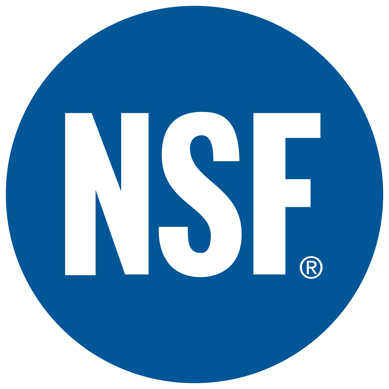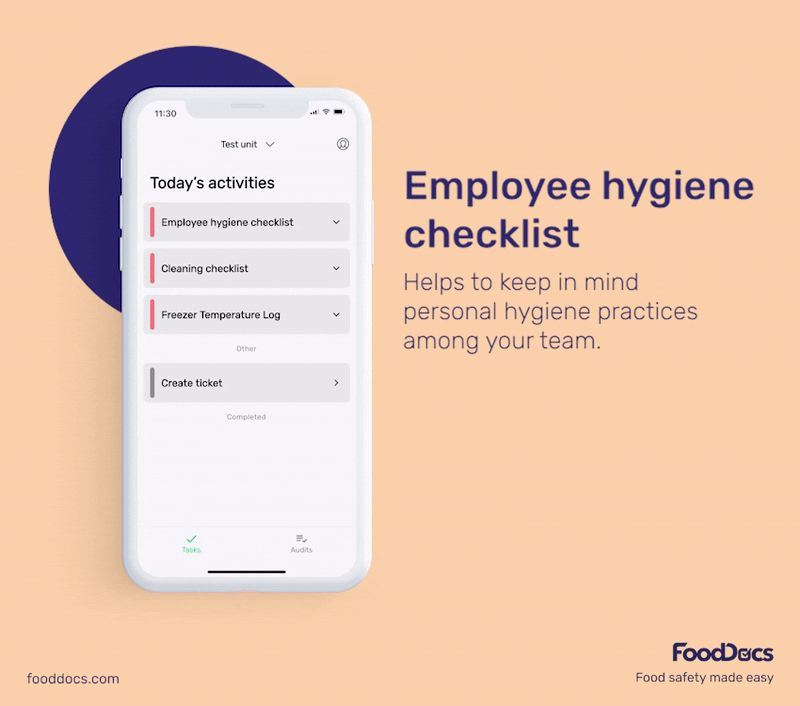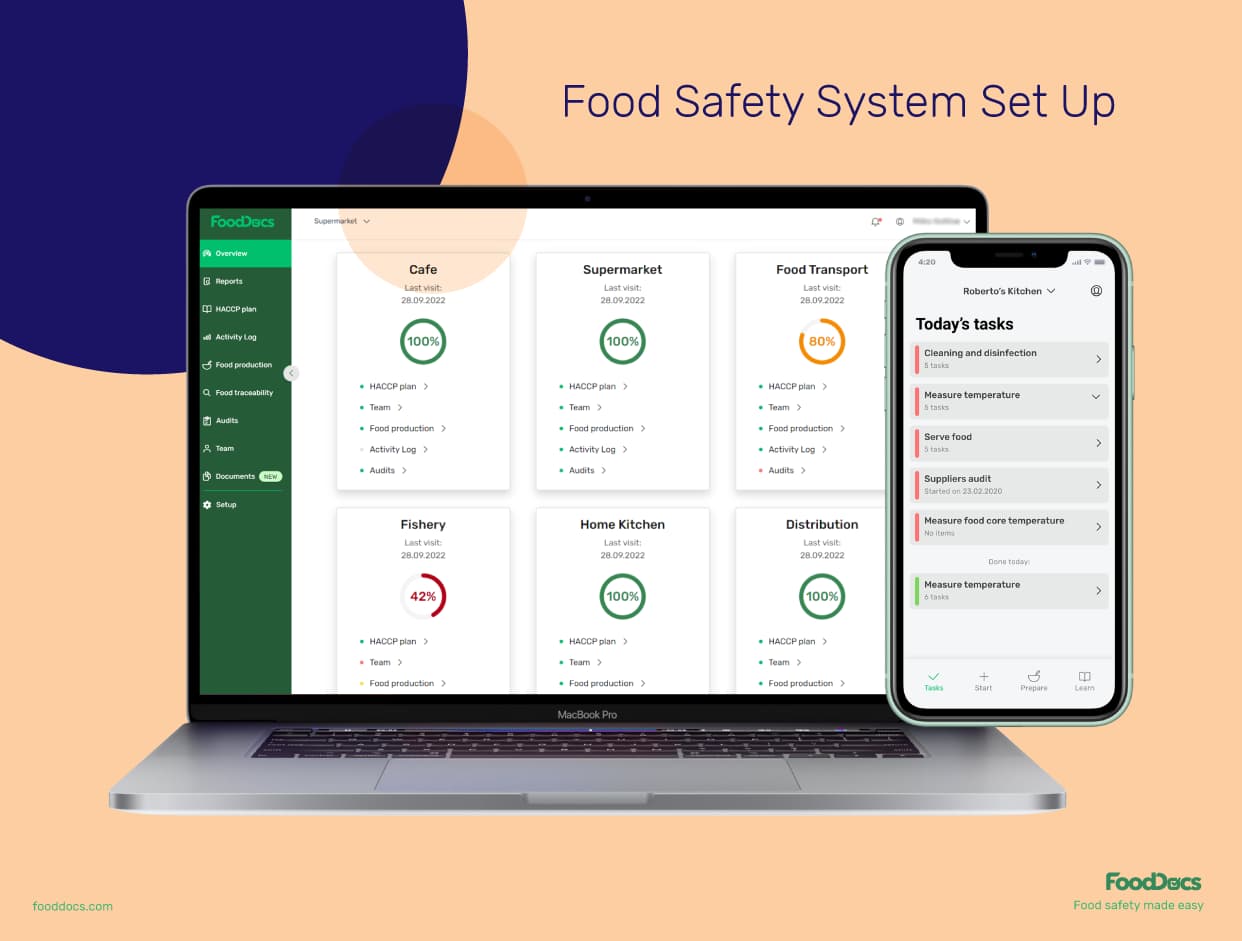Mastering Restaurant Sanitizing: Best Practices for Kitchens and Dining Areas
Master restaurant sanitizing with clear steps for kitchens and dining areas. Learn methods, checklists, and procedures to keep your team safe and...
NSF-certified products or food business services are highly regarded in terms of safety and quality.
Perhaps one of the most widely recognized certification programs is from NSF International. This non-profit organization provides analytical testing services and certifies business operations and operations for compliance with regulatory standards.
To ensure safety through proper sanitation and design of equipment and facility, businesses aim for certification status. In the food industry, securing an NSF certification serves as very strong proof of your business's commitment to protecting public health.
NSF International is an organization that is dedicated to safeguarding human health by developing public health and safety standards, as well as offering certification, auditing, and testing services.
WHAT WE'LL COVER:
In this part of the article, we will discuss the following topics:
The NSF, or National Sanitation Foundation, is a globally recognized organization that established and provides independent standards in ensuring the hygienic design of food business equipment and layout. The foundation is a United States-based organization that aims to protect public health from food safety problems.
NSF works closely with the FDA as it ensures that food businesses operate in compliance with the food safety standards set by the federal agency. To date, the NSF provides more than 140 active public health standards and testing instructions as part of its services, which are available in more than 170 countries.
The NSF provides certification to qualified businesses as proof of their compliance with food safety regulations.
NSF's acronym definition is National Sanitation Foundation. NSF is a global organization acting as a third-party certification program that provides standards for sanitation, food services, and other fields.
The foundation is recognized as a credible provider of scientific and technical expertise in health. It provides a range of testing protocols for businesses and manufacturing facilities, such as for water treatment systems and food sanitation management.
NSF provides a wide range of certification programs and services beyond sanitation, such as food safety audits, equipment inspections, and supplier assurance audits.
The NSF International logo, or NSF mark, is used to serve as proof that a product, equipment, or system was reviewed and certified by NSF International to meet stringent food safety and product quality standards. The NSF logo is shown as a circle with the initials NSF on it.

National Sanitation Foundation International Logo
You can see the NSF logo on products such as nutritional supplements, food equipment, plumbing components, building materials, and others. Specifically, the mark ensures food businesses and consumers of the following:
Having the NSF logo is a significant competitive advantage in the food industry. The logo serves as proof that a product or business brand has been inspected by the NSF. Federal government agencies, such as the Food and Drug Administration, U.S. Department of Agriculture, and American National Standards Institute, recognize the NSF logo to be a mark of strict compliance with food safety protocols.
Secure your NSF logo today and ace your certification program with the help of the FoodDocs smart Food Safety Management System. With our AI-powered software, you can manage your food safety tasks, record results, and keep track of your progress efficiently.
The NSF provides essential guidance and certification for food businesses. They help ensure public health safety by standardizing operations, equipment, and products according to established international standards.
NSF is an important part of the food industry for the following reasons:
The NSF supports the roles of food safety agencies by ensuring that regulations and policies are being met by food businesses. The organization aims to standardize products and food operations according to the most applicable food safety regulations.
NSF International is an organization that aims to promote human health by standardizing food operations and products according to safety regulations. In 1944, the organization was first established as the National Sanitation Foundation and was the first to establish standards for the sanitation of soda fountain.
Soon after, the organization developed more national sanitation standards for public safety. Today, NSF international, or now more commonly known as NSF, is globally recognized as a leading provider of standards and certification for food safety, food and water testing, consumer products, and industrial operations. The NSF International logo is regarded as a significant status of safety and quality.
The NSF International headquarters is located in Michigan, but the organization operates laboratories and offices in more than 170 countries around the world.
Businesses with the status of NSF-certified or NSF-listed represent their compliance with regulatory standards. Securing the NSF-approved status proves to consumers that your food business takes public safety seriously and that your products are safe for human consumption. The status can be shown in internal and external communication letters to show that a business brand has passed the certification requirements.
The NSF International certification is one of the most widely known sanitation certification programs in the U.S. and is trusted by the highest federal agencies. In addition, NSF-certified products and businesses gain a significant advantage over competitors as getting certified means that your products or equipment underwent strict screening and inspection.
In particular, NSF certification does not only benefit food and equipment manufacturers but food service businesses as well. The foundation offers certification programs for ensuring that risks and contaminations are controlled in a food business.
Securing the NSF certification opens a lot of doors for food businesses. The certification can increase the profitability of your brand as a food processor and gain more attention from suppliers and consumers.
Below are the most notable certification benefits for food processors:
The NSF certification, being internationally recognized, provides a significant list of benefits in terms of food safety assurance and a boost in product sales within the food supply chain. The comprehensive certification will also help train food handlers to meet regulatory standards and maintain compliance properly.
There is no law required for a food business to secure an NSF certificate. Although, some businesses or regulatory bodies may specifically request or require for it.
A good example is commercial kitchens in the U.S. Health departments often require commercial food industry equipment, such as sinks, dishwashers, cutters, and preparation tools, to be NSF certified. The status proves that all pieces of commercial food equipment comply with food safety standard requirements.
Achieving the NSF certification mark makes passing inspections from health departments significantly easier. It provides many food protection benefits to food equipment manufacturers and food service providers alike.

The NSF certification process is very specific to the product or process being certified. The institution has several types of programs that apply to different industries.
Follow these general steps to start your NSF certification process:
Choose from NSF's list of certification programs with the most appropriate certification criteria for your product or services. Select whether you want a product, system, service, or supplier to get accredited. If you are aiming to certify your food equipment, choose an equipment certification process.
Duly fill out NSF's application form, which will guide the organization regarding your requirements.
Your business team must prepare according to the expected inspection service. Collect all essential documents, ensure that your food preparations and other operations are compliant, and prepare the necessary samples for laboratory testing. Your team must prove that your business complies with hygienic design standards.
After the inspection, the auditor will provide your test results. During this part, the auditor will also provide any points for improvement or areas that need to be immediately addressed. You can only achieve the certification status once these issues are resolved.
After passing the certification program, your business must maintain the level of competence evaluated by the NSF team. The certification program is not a one-time event. Your progress will be used for evaluation during the NSF reassessment and periodic facility audits.
During inspections of manufacturing facilities, if a product is evaluated to have critical risks or in the event of noncompliance, the NSF team will also provide enforcement actions, such as a product recall and public notification, to minimize food safety violations.
The certification process can take as little as 4 months. During this time, the business will be focusing on complying with the set standards. Although other processes to complete the certification may take a total of 18 months to complete.
The key to maintaining compliance with the highest product standards and health codes is consistent monitoring.When food safety managers have enough real-time information, they can make more informed decisions and address situations on time.
You can get the most out of these solutions when you use a digital Food Safety Management System. With FoodDocs' smart software, you can save at least 20% of your time supervising your team onsite and get a real-time overview of your food processing operations, which can help you immediately point out areas that need more attention.
The NSF certification program requires an annual registration and certification fee. The entire certification process cost may vary depending on the scope of the inspection. An annual registration fee amounting to $750 must be settled before the certification process. In addition, an additional $1,500 application for review and $2,000 for each aspect for testing are required.
The most accurate way for your team to secure a total quotation for the process is to directly contact NSF International and provide them with your specific food safety requirements. The organization will then provide a direct quotation based on the information you provide.

Like any other certification program, the process can become more efficient and secure if your food services and documents are all in place before the inspection. Once secured, compliance must be consistently maintained to uphold the benefits of the certification.
With FoodDocs' smart Food Safety Management System, you can efficiently prepare for an NSF certification program and consistently maintain compliance post-inspection.
Prepare your entire food business for an inspection and maintain compliance consistently using the following benefits of our smart software:

Employee hygiene checklist from FoodDocs
Our smart solutions can also help managers improve efficiency and ensure compliance remotely.

Food Safety System Set up by FoodDocs
Setting up our smart Food Safety Management System takes only 15 minutes. You can immediately implement our solutions into your system and start tracking your operations digitally.
What's more, is that our smart software can accommodate revisions and improvements. Immediately apply suggestions from your NSF auditor by simply customizing the generated monitoring logs.
Secure and maintain your NSF-certified status with the help of our smart solution. Do you have an inspection coming up? Prepare your team and experience our services for free with our 14-day free trial now.
Do you need more information about the NSF certification? We gathered some of the most frequently asked questions about this topic and answered them for you.
The NSF meaning refers to the independent, non-profit organization National Sanitation Foundation.
NSF-certified refers to the status given to a product or business that has gained a passing NSF rating during the certification process. NSF-certified products or businesses are highly regarded in terms of safety and quality.
NSF International is an independent agency. It generates its funds through the fees it collects for its services and is not funded by any government agency.
NSF certification is not required by any law for regulatory compliance. Despite this, some agencies, suppliers, or private organizations may require the certification as proof of credibility and food safety.
NSF-certified food businesses or those with certified industrial products are required to undergo regular re-testing to ensure compliance and renew their certification.
The main headquarters of NSF International is in Ann Arbor, Michigan.
The NSF certification program is an internationally accredited, independent third-party certification body that sets standards for different industries. Securing the NSF mark shows that your business is compliant with the highest standards.
Master restaurant sanitizing with clear steps for kitchens and dining areas. Learn methods, checklists, and procedures to keep your team safe and...
Learn challenges healthcare foodservice teams face today and key food safety practices to protect vulnerable patients. Get a free healthcare leader...
Learn what Standard Operating Procedures (SOPs) are and how to write effective SOPs that ensure consistency, efficiency, and safety in your...